Iranian MP Accuses CENTCOM Of Directing Gaza War
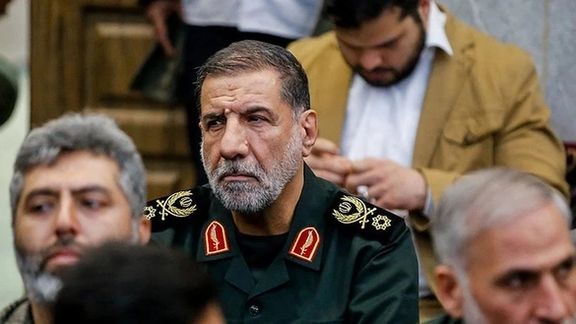
An Iranian MP has accused the United States' CENTCOM of directing military operations in the ongoing Gaza conflict.

An Iranian MP has accused the United States' CENTCOM of directing military operations in the ongoing Gaza conflict.
Esmail Kosari, a member of the National Security and Foreign Policy Commission of the Iranian Parliament and a commander in the Islamic Revolutionary Guard Corps (IRGC) stated, "the crimes that America is currently committing are more repugnant than Israel's because the command of the crimes lies with CENTCOM."
The claims follow Iran-backed Hamas' declaration of war on October 7, when thousands of its militia invaded Israel by air, land and sea, killing at least 1,400 and taking 230 hostage in Gaza, including women and children. While Iran denies directing the operation, it funds Hamas at least $!00m a year and backs it with the likes of military and technical support and training.
The US was quick to back Israel's right to defend itself, offering its support and sending warships to the region as Iran's leaders rallied its regional proxies to ready for a multifront conflict, but has called for calm in a bid to prevent regional escalation.
Kosari's unsubstantiated allegations claimed that the “lack of a cohesive spirit within the Israeli regime prompted the US to send CENTCOM commanders to Gaza to direct military operations” though there is no US presence in Gaza, which is solely controlled by Hamas, designated by the US, EU and UK.
His comments come at a time when US facilities in the region have come under increasing attacks from Iran-backed proxies and fears of its largest proxy, Hezbollah, joining the war, are ever present.
Just days ago, Iran's Foreign Minister Hossein Amir-Abdollahian issued a warning regarding the United States' support for Israel during his visit to New York to attend a special session of the United Nations General Assembly.
In an interview with Bloomberg Television from Iran's mission to the UN in New York, he warned, "The US is advising others to show self-restraint, but it has sided with Israel totally."
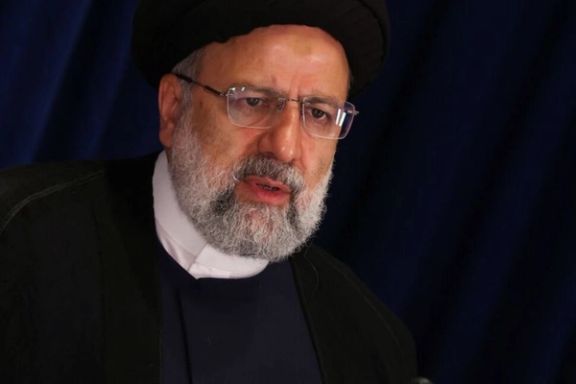
Iranian President Ebrahim Raisi issued renewed threats to Israel and the US after Israel launched a ground offensive in Gaza against Iran-backed Hamas.
"The Zionist regime's crimes have crossed the red lines, which may force everyone to take action," he said, suggesting once again the threat of action from its proxies in the region.
"Washington asks us to not do anything, but they keep giving widespread support to Israel," Raisi stated in his post on X on Sunday morning.
Iran's proxies have continued to target US facilities in the Middle East since the war declared by Hamas broke out on October 7 after its elite forces invaded Israel, killing at least 1,400 and kidnapping at least 230. Its Yemeni proxy, the Houthis, even fired rockets towards Israel, intercepted by the US and Saudi Arabia.
IDF spokesman Daniel Hagari confirmed the ground invasions, explaining they are being carried out "in a phased manner". He said, "This will take time."
Denying its hand in the ever heightening regional tensions, the Iranian president claimed its proxies are "independent" and "do not receive any orders from Tehran", blaming the US.
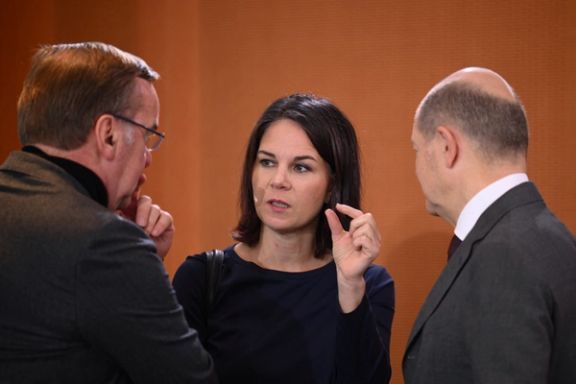
Among the questions that keep popping up in the Iran-backed Hamas’ war against Israel is this: Why hasn’t Germany sanctioned the IRGC?
German government administrations have claimed that Israel’s security is Germany's Staatsräson (raison d'etre). For many veteran observers of the German-Israel relationship, the litmus test for Berlin’s pledge to the security of the Jewish state is its policy toward the Iranian regime, which has been threatening to eliminate Israel for decades.
When Iran International recently asked the German interior ministry if it plans to outlaw Iran’s Islamic Revolutionary Guard Corps for aiding Hamas in the massacre of 1,400 people on October 7, a spokeswoman declined to answer, but noted “The security authorities in Germany have Hamas in their sights. The Federal Chancellor and the Federal Minister of the Interior have decided that bans on any activity by Hamas and the Samidoun group in Germany will be issued. In doing so, the federal government is sending a clear signal that solidarity with and support for Hamas terror will be stopped.”
The spokeswoman added, “ The Federal Ministry of the Interior and the security authorities involved are intensively preparing these bans and will enforce them as soon as possible. Of course, no information can be given in advance on the timing and details of operational measures in order not to jeopardise these measures.”
There are 450 active Hamas operatives within the territory of Germany, according to the Federal Republic’s most recent intelligence report. The interior ministry spokeswoman declined to say if any Hamas operatives have been detained. Brigadier General (ret.) Amir Avivi, Founder and CEO of IDSF (Israel's Defense and Security Forum) told Iran International Germany should “arrest these people” and “take action against the extremist entity.”
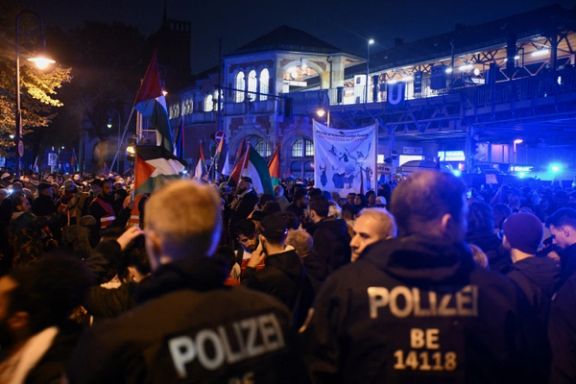
Germany has banned the activities of Hamas and Hezbollah but continues to permit their members to operate, including 1,250 Hezbollah supporters.
There have been some voices calling again for Germany to push for a ban of the IRGC. The Free Democratic Party—a member of German Chancellor Olaf Scholz’s governing coalition—said after the October 7 terrorist attack “We therefore call for the sanctions against Iran to be expanded together with the EU and USA and for the EU to actively work towards classifying the Iranian Revolutionary Guard as a terrorist organization.”
Yet, the German government could unilaterally outlaw the IRGC and not hide behind the EU curtain, according to experts. The Christian Democratic Union MP Norbert Röttgen said the German public was being “deceived” by the Green Party foreign minister Annalena Baerabock who claims the authorities need legal cases to sanction the IRGC. In 2019, the US designated the IRGC a terrorist organization. Röttgen argues the pre-conditions have been met to proscribe the IRGC a terrorist organization.
German engineering companies and banks continue to engage in flourishing business deals with Iran, with at least $1.2 billon in export trade to the Islamic Republic in 2022. If Scholz sanctioned the Guard Corps, German companies would take finananical hits due to the IRGC’s vast control over Iran’s economy. Iran International exclusively revealed the presence of German and Austrian companies at the Iran Oil Show this year, in apparent violation of US sanctions.
Iran’s ally Hamas has been met with scarce resistance in some German cities. The mayor of Stuttgart, Frank Nopper, permits a pro-Hamas group to post its contact information on the municipal website. The city of Bremen, however, deleted a notice on its city website on October 23, for the reportedly pro-Hamas “Bremer Peace Forum” group.
In May, Israel’s government rebuked Germany’s ambassador Steffen Seibert, who participated in a memorial event for Palestinian terrorists and Arab and Jewish victims of terrorism.
Seibert’s participation in the ‘Alternative Day of Remembrance’ ceremony sparked a street protest by Israeli NGOs against him at his residence.
Germany’s embassy in Tel Aviv told Iran International that “Ambassador Seibert did not participate in any ‘memorial event for Hamas terrorists’ in the past and will, of course, not do so in the future.”
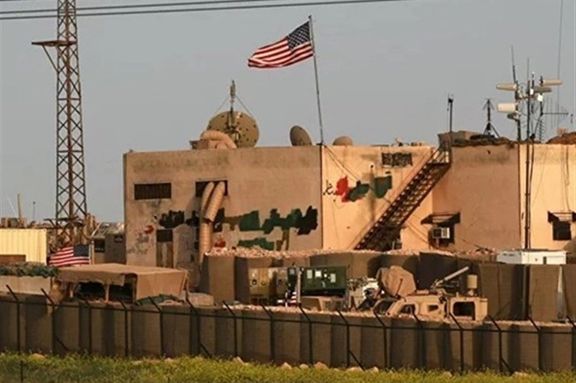
An Iran-affiliated group in Iraq claimed Sunday that it targeted a US military base in Syria with drones, Tasnim news website affiliated with the IRGC reported.
There is no independent conformation of the claim, which comes days after the United States launched an air strike against two targets in Syria belonging to Iran’s Revolutionary Guard (IRGC) in retaliation for earlier attacks on US bases.
Since the October 7 terror attack on Israel, Iranian proxy forces in Syria and Iraq resumed rocket and drone attacks against US bases in both countries. After more than 15 such attacks, Washington retaliates in the early hours of Friday, in what was seen as a limited retaliation.
Hours after the US airstrike, Tasnim quoted the Islamic Resistance in Iraq, a pro-Iran militant group, as claiming that two attacks were launched at US bases, but the US military did not report any incident.
In the latest claim, the Iraqi group said it had launched two drones against a US base in in northeast Syria near al-Hasaka. The report did not provide any other detail.
Tensions have sharply risen as the Israel-Hamas war continues into its fourth week, and Iran threatens that its proxy forces will expand the conflict if Israeli attacks on Gaza continue. The United States has dispatched powerful naval strike groups to the region and has warned others not to get involved in the conflict.
Despite bellicose statements, Iran seems to be cautious, as its main proxy force, the Lebanese Hezbollah has so far not opened a second front against Israel.
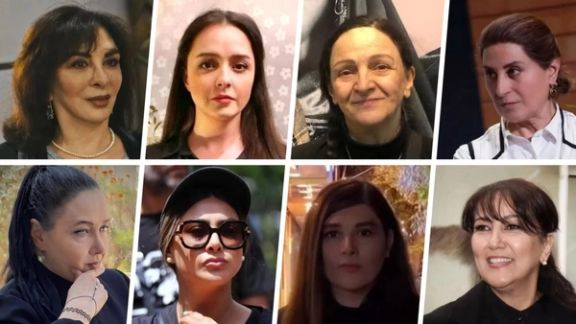
Prominent actresses banned for hijab defiance and supporting protests say not acting is a choice they made to protect their professional dignity before being banned.
“My honor does not allow me to act in [Iran's highly controlled] film industry. Who are you [to ban me]?” Katayoun Riahi said on Instagram in a post that included the photos of the twenty colleagues who were officially banned from acting earlier this week. “I never believed [in the necessity of wearing] the hijab to have ‘removed’ mine now,” she told Iran International TV in November.
“I said goodbye to the world of acting when I was in solitary confinement at Evin prison,” Hengameh Ghaziani, who has also been banned, wrote in an Instagram post. Referring to her interviews with Persian-language media outside Iran, Ghaziani was indicted for “contact with hostile and anti-revolutionary media”.
Pantea Bahram, another banned actress, said in an Instagram story after the release of the list that being banned is the least of her concern, with so many protesters still in prison, and when young girls and boys lost their eyes to the bullets of security forces during the crackdown on protesters in 2022 and 2023.
The ban has met much criticism from others in the film industry. “I feel ashamed of looking at the list in which there are the names of no men. I’m proudly standing with my [female] colleagues until they return [to work],” Mohammad Rezayi-Rad, theater director, announced on Instagram.

Iranian actresses are required to cover their hair in the films they play. The ministry enforces the hijab, as well as censorship of content, by rejecting scripts or modifying them and refusing a public screening license if a film does not meet their requirements.
Banned actresses expressed solidarity with protesters and the anti-hijab movement, often posting photos of themselves without headscarves during last year’s nationwide protests following Mahsa Amini's death in custody.
Riahi, 62, and two other celebrity actresses, Golab Adineh and Fatemeh Motamed-Aria, also showed up with no headscarves at the funeral of popular film director, Kiumars Pourahmad, who tragically ended his own life in April.
Speaking to reporters on the sidelines of a cabinet meeting Wednesday Islamic Guidance Minister Mohammad-Mehdi Esmaili confirmed the ban earlier announced by a ministry official in charge of the film industry.
“We announced before that abidance by the hijab is a legal requirement … I have said several times that those who do not abide by the law cannot work [in the film industry],” Esmaili said.
The list of the banned actresses was released on the same day by the director of the supervision department of the ministry’s Cinema Organization, Habib Ilbeigi.
Some of these celebrities, including Riahi, were arrested for their hijab rebellion. Riahi had to apologize for her defiance under duress during her trial last December. Unable to bear the relentless psychological torment, she passed out and had to be taken to hospital by ambulance. The trial was being filmed, apparently for airing on the state television to discourage others from following suit.
Actresses' open rejection of hijab led to some losing roles in TV sitcoms, the cancellation of entire shows, and censorship of their previous films.
In November last year, House of Cinema, formerly known as the Iranian Alliance of Motion Picture Guilds, said 100 filmmakers and other movie, music and theater personalities had been arrested or banned from work since the Mahsa Movement protests began in mid-September 2022.
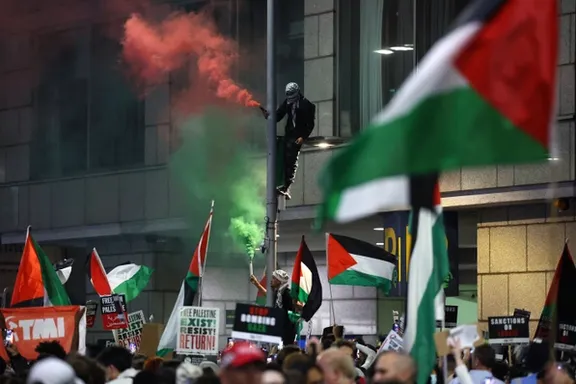
Iranian agents are stirring up unrest in the UK through Gaza protests, according to a report by the British newspaper The Times.
There is direct involvement of the Iranian regime through the physical presence of operatives at protests as well as through disinformation campaigns conducted online.
A third consecutive weekend of pro-Palestinian protests is being policed in London by more than 1,000 officers. Saturday's rally brought out a 100,000 crowd.
The report about Iranian involvement in protests in Britain follows repeated calls for the UK to ban Iran's Islamic Revolutionary Guard Corps. Currently, the British government is under increasing pressure to intensify its campaign against Iran.
During one of the pro-Palestinian rallies in London a British-Iranian activist who has staged a sit-in protest outside Westminster calling for the IRGC to be proscribed as a terrorist organization, was assaulted by pro-Palestinian demonstrators. Vahid Beheshti, 46, said a Hamas supporter threatened to cut his throat.
While a proscription could still happen, it is unlikely that any change will occur soon, according to The Times. Banning the IRGC would lead to "the loss of intelligence-gathering capabilities" since while the United States and Canada have both banned the IRGC, they are reportedly dependent on Britain's influence in Tehran.
However, the British government has increased sanctions, since Mahsa Amini's death in September 2022, as a response to human rights violations committed by the regime's IRGC forces and specifically pledged to enhance protection for Iranian journalists based in the UK in response to the suspension of Iran International's UK operations, which was based on advice from the London Metropolitan Police, following continued threats to its employees.